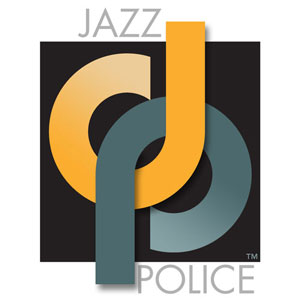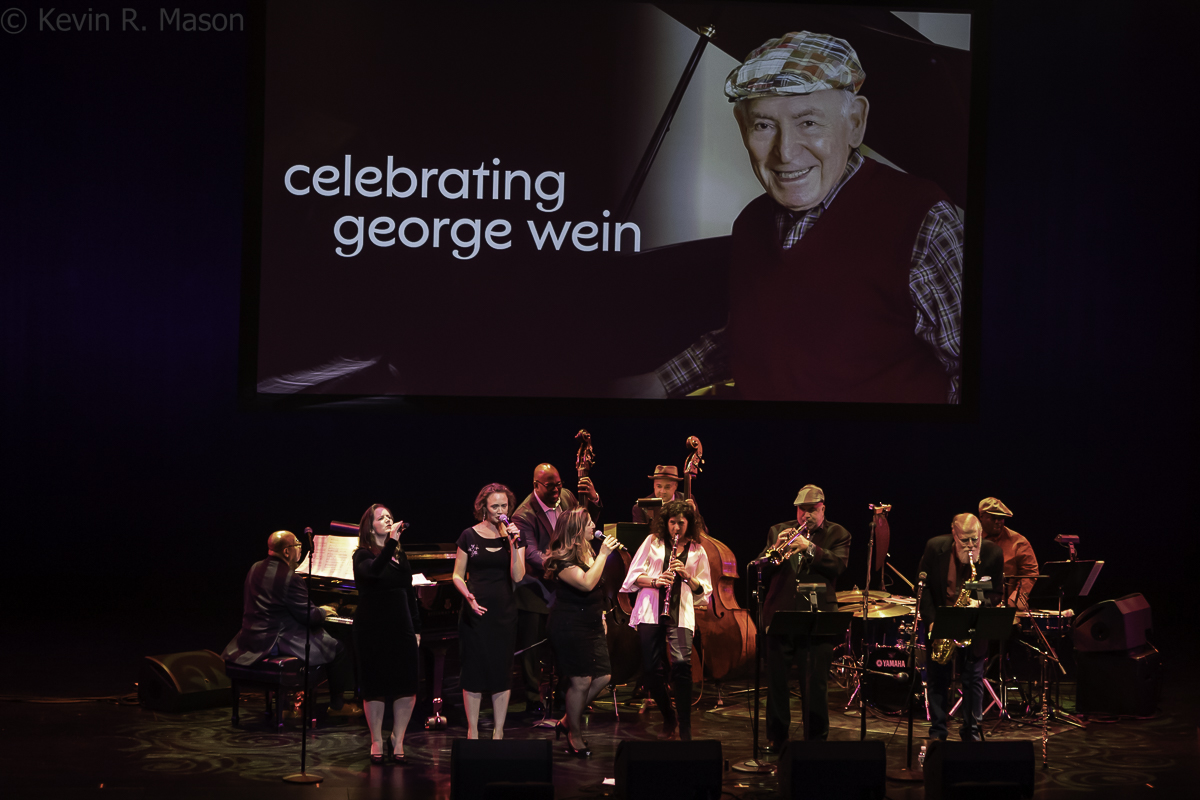
The 2022 summer jazz season is upon us! But before it is over, here’s one more (long overdue!) last look back at one of the best major jazz events from 2021, The TD James Moody Jazz Festival.
From November 5 to 21, the 10th annual TD James Moody Jazz Festival was held at New Jersey Performing Arts Center (NJPAC) and other locations in Newark, NJ. This Festival has really become an established yearly jazz highlight in the fall.
WBGO Kids Jazz: Don Braden Septet
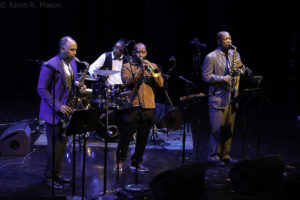
A recorded introduction by Christian McBride started this free concert on November 7. McBride, NJPAC’s Jazz Advisor, stated, “Whenever I perform at the Arts Center, I often get to play bass alongside people I consider the royalty of jazz. They’re all superb artists who know they’re in the company of friends when they come to Newark, a city with a rich jazz history.” Then, “Newark’s First Lady of Jazz” and NEA Jazz Master, Dorthaan Kirk, took the stage. “This is the opening weekend of the annual TD James Moody Jazz Festival, and it’s bringing the jazz close to home.” She talked about the collaboration between WBGO Radio and NJPAC, then introduced the Don Braden Septet.
The evening was a combination concert/educational event. There was an informative program titled “From Sassy to Shorter – Music of Newark Jazz Masters,” with fun facts and bios of notable musicians. Tenor saxophonist/flutist Don Braden added instructive musical insights between songs.
Braden was joined by drummer Jeremy Warren, bassist Mimi Jones, keyboardist Kyle Koehler, trumpeter James Gibbs, alto saxophonist Bradford Hayes, and vocalist Dr. Trineice Robinson. Their first piece, “Last Train From Overbrook,” composed by the great James Moody, was a lively, straight-ahead jazz number with fine solos by Braden and Jones, and some evocative “choo-choo” effects.
Braden said, “Welcome to the wonderful Victoria Theater here at NJPAC. I’m glad to be back.” He introduced the band, then spoke about the Festival’s namesake. “James Moody was one of our legendary saxophonists, flutists, and composers…he’s one of our great inspirations.”
He continued, “Newark is one of those historic jazz places, partly because of this incredible population and culture, and also because of its proximity to New York. A lot of people came through here to play.” He explored the differences between a piano and an organ, and how an organ player can perform the bass and keyboard lines at the same time. He introduced Larry Young’s “If” and said it’s a modern jazz blues, not like the BB King old-school blues. “Blues has a very important sound and cultural kind of connection to all jazz music…On almost every gig, we’ll play some kind of blues.”
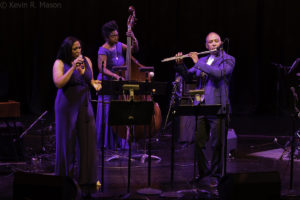
Braden discussed classic songs composed by Jerome Kern, and how “All The Things You Are,” was made famous by Newark’s own Sarah Vaughan. He then brought vocalist Dr. Trineice Robinson on stage to sing the standard. Her rich voice, blending jazz and operatic influences, began as a duet with pianist Kyle Kohler. The other musicians joined in, with James Gibbs adding an outstanding trumpet solo.
The group performed “Obsession,” from Sarah Vaughan’s album, Brazilian Romance. Trineice’s vocals were in perfect harmony with the band on this Latin delight, which included Braden’s excellent phrasing on the flute. They followed with Braden’s arrangement of Wayne Shorter’s renowned song, “Speak No Evil,” which was featured on Braden’s album, Voice of the Saxophone.
The floor was then opened for questions. With an audience full of kids, a woman asked, “What are you going to do for the children?” Braden responded, “So, young people perceive a lot…A big part of what we are presenting in this case is giving them the real music, letting them feel the energy, the love, the creativity…This music has got human power that goes beyond the complexity/education. There’s a soul, spiritual part of it underneath that we hope is coming through to you.” He discussed instrumental jazz vs. jazz with vocals. “It’s all jazz, we’ll start there, and the voice is the first instrument, and most important instrument.” He described how much any wind player uses “voicing” to help optimize their tone. When lyrics are added, that includes another dimension. Dr. Robinson discussed how jazz vocalists added improvisation to popular standards. Braden noted that people are used to hearing voices spoken every day, but instrumental music is more complex to the human ear. However, there’s a strong partnership between vocal jazz and instrumental jazz, and vocals are a way for audiences to become more acclimated with instrumental music.
When a child asked why jazz makes you happy, a conversation ensued about how much tradition is behind the music, and how much love has gone into jazz. Once you start getting used to the nuances, the language, and the different sounds of jazz, you can’t help feeling happy when listening to this gift to the world. Someone asked how musicians achieve high and low notes. Braden had Bradford Hayes demonstrate some high and low riffs on his alto saxophone. Then Braden expounded on the techniques used to navigate the scales and octaves on various instruments.
After the Q & A period, the last song was Ray Noble’s “Cherokee,” one of Sarah Vaughan’s biggest hits. Braden said jazz musicians love this standard, which is known by players worldwide. The group performed a rip-roaring rendition, and each player had their moment to shine. This was an enjoyable and enlightening event, like a Master Class, filled with history and outstanding music, and not just for kids!
Christian McBride’s The Movement Revisited: A Musical Portrait of Four Icons with Special Guests The Last Poets
Actually, five icons were celebrated in this concert. In the program, it said, “Bassist, bandleader, and composer (and NJPAC’s Jazz Advisor), Christian McBride has already played everything from Monk to Funk. And yet this latest project is his most ambitious yet: A full-length work for jazz orchestra, choir, soloists and orators, celebrating the great leaders of the Civil Rights Movement. The praises of five monumental figures will be spoken and sung in this piece: Rosa Parks, Malcolm X, Muhammad Ali, Martin Luther King, Jr. and President Barack Obama.”
On November 11, John Schreiber, President of NJPAC, said, “Welcome. Welcome home!…This is the first time I’ve been in a theater in like 20 months…Tonight’s performance is part jazz concert, part poetry reading, part celebration of the social justice movement.” Schreiber thanked the sponsors and the Festival’s collaborators at Rutgers University. He introduced Linda Moody, James Moody’s widow, who was in the audience, calling her “The Godmother of the TD James Moody Jazz Festival.” He added that you never saw the two of them together when they weren’t holding hands. “That’s love, right?”
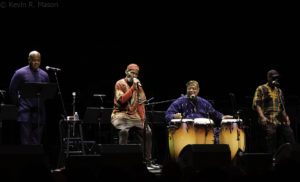
Schreiber introduced The Last Poets, who came onstage dressed in African attire, joined by Newark’s mayor, Ras Baraka, son of the late poet/playwright, Amiri Baraka. In the first song, Babadon Babatunde played an insistent, elaborate drumbeat that was described as a heartbeat, “Because that’s all the drum is, a heartbeat.” On “The Pledge” there was lots of audience participation, with call-and-response. Even in masks, the crowd was really into it. The group, which also included Abiodun Oyewole and Umar Bin Hassan, performed impassioned, provocative spoken word, and the set included “For the Millions.” They followed up with a non-stop stream-of-consciousness that challenged the status quo. At one point, a group member said, “You know who’s smiling now? Amiri Baraka!” They continued with the incendiary “When the Revolution Comes” and finished with “This is Madness.” They had the crowd riveted.
After an intermission, John Schreiber said, “Welcome back, Ladies and Gentlemen…Reading the words of Muhammad Ali – Dion Graham; reading the words of Malcolm X – Willie Perdomo; reading the words of Dr. Martin Luther King, Jr. – John Murrillo; reading the words of Rosa Parks – Ms. Sonia Sanchez! Lead vocals, Alicia Olatuja, and leading The Voices of the Flame gospel choir, Mr. J.D. Steele…The composer, Christian McBride, and his big band!” John Murrillo read Martin Luther King, Jr.’s quote, “Darkness cannot drive out darkness, only light can do that. Hate cannot drive out hate, only love can do that.”
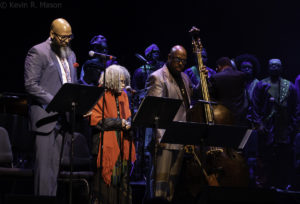
Sonia Sanchez spoke about police brutality and the Montgomery Bus Boycott, and then recited Rosa Parks’ words, “Human dignity must be respected at all times. I would have compromised my dignity if I had buckled one more time…I would have also compromised my dignity if I had resisted violently…Every day of my life, I wanted to be treated with respect.”
Willie Perdomo read from Malcolm X’s speech where he recanted his previous mistrust of white people. “I am not a racist. In the past, I have permitted myself to be used to make sweeping indictments of all white people…and these generalizations have caused injuries to some whites who perhaps did not deserve to be hurt…I wish nothing but freedom, justice, and equality, life, liberty, and the pursuit of passion for all.”
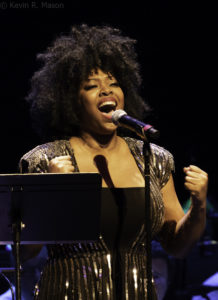
Alicia Olatuja sang a moving, elegiac tune and was beautifully backed by the band. Dion Graham recited the confident words of Muhammad Ali, followed by an exuberant performance of “Rumble in the Jungle.” John Murrillo delivered Dr. King’s “I Have a Dream” speech with almost as much emotion as King originally did, with somber musical accompaniment. Then, some rousing gospel was performed by The Voices of the Flame.
The speakers recited President Barack Obama’s eloquent words from the night of his first election. “If there is anyone out there who still doubts that America is a place where all things are possible, who still wonders if the dream of our founders is alive in our time, who still questions the power of our democracy, tonight, tonight is your answer…There are many who won’t agree with every decision or policy I make as president, and we know that government can’t solve every problem. But I will always be honest with you…I will listen to you, especially when we disagree…As Lincoln said to a nation far more divided than ours, we are not enemies, but friends. Though passion may have strained it, it must not break our bonds of affection. And to those Americans whose support I have yet to earn…I hear your voices. I need your help, and I will be your president.” The group chanted over and over, “Yes, we can!” to a backdrop of swinging grooves.
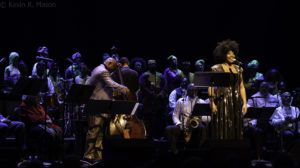
This uplifting evening was a remembrance that great words live forever. Throughout history people have fought for equality, and music has been used to inspire and comfort. In these turbulent times of division and civil unrest, social justice is still an important goal.
Chris Botti
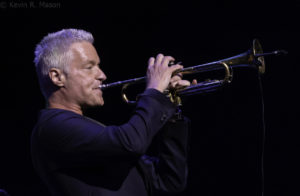
On Friday, November 12, Christian McBride introduced trumpeter Chris Botti, saying, “Coming to the stage is one of my favorite musicians in the world. He’s one of my favorite people in the world. We’ve played together in a lot of settings throughout the years, and he is always a smash hit everywhere he goes…It’s my honor to introduce to you, the great Chris Botti!”
The group started with a soaring “Someone to Watch Over Me,” with exquisite trumpet playing by Botti, and an outstanding violin solo by Caroline Campbell. “When I Fall in Love” had many touching moments. Botti was also joined by keyboardist Holger Marjamaa, bassist Reggie Hamilton, drummer Lee Pearson, and guitarist Leonardo Amuedo.
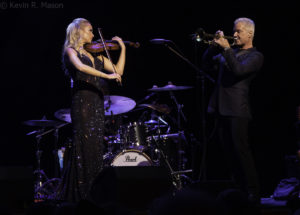
The group played a sinuous jazz number that shone a spotlight on each player. Botti said, “We are so very, very grateful to be back, performing for everyone, and it’s an incredible honor.” He brought Caroline back, and good-naturedly teased her about occasionally missing his shows to perform with Andrea Bocelli. They bantered, much to the amusement of the audience. Botti is a showman and a jokester, but he clearly takes the music seriously, and is a generous bandleader who readily shares the spotlight. The “Theme From Schindler’s List” was a breathtaking duet between Botti and Campbell. Botti, a skillful raconteur, told some amusing anecdotes about meeting his childhood idol, Doc Severinsen, and their ensuing friendship/mentorship.
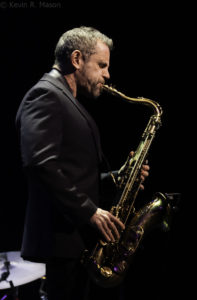
With much praise, Chris brought out special guest, saxophonist Andy Snitzer, to play on “You Don’t Know What Love Is.” Snitzer really lived up Botti’s praise, while Marjamaa had a standout improvisation, and Hamilton’s fingers flew up and down his bass. Dynamic drummer Lee Pearson performed an explosive drum solo where he actually played the drums with both hands behind his back!
A movingly sweet ballad, “You Are Not Alone,” was played as a duet with Botti and guitarist Leonardo Amuedo. Another duet with Amuedo was Leonard Cohen’s “Hallelujah,” and it was truly a thing of beauty, with Botti’s trumpet commanding the stage.
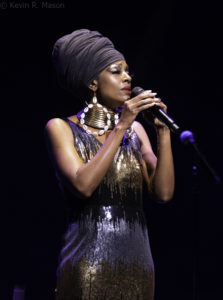
Chris came into the audience to play an exceedingly romantic “Over the Rainbow,” enthralling the crowd. Vocalist Sy Smith joined Botti on “In the Wee Small Hours of the Morning,” which she rendered passionately in her multi-octave voice. She followed up with a glorious “Embraceable You.”
Caroline Cambell had a solo spot, holding the audience spellbound as she moved from genre to genre. Such was her musicianship, that she received several spontaneous ovations during her mini set.
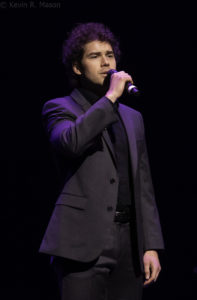
Botti introduced another special guest, singer Jonathan Johnson, to perform an impressive rendition of the opera classic, “Nessun Dorma.” Then Chris lauded chanteuse Veronica Swift, who sang the loveliest “There Will Never Be Another You,” starting as a ballad, then jumping into a bebop section where she showed some exceptional scatting. Veronica continued with “I’ve Got You Under My Skin” and had the crowd clapping along enthusiastically. She continued with “Moanin,” expertly supported by the band, again showing off her scatting chops. She even surprised everyone by taking Botti’s trumpet and effectively blowing a few phrases.
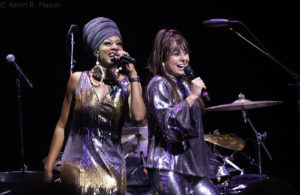
Sy Smith returned to lead Earth, Wind, & Fire’s “Shining Star,” a rousing finish to a concert that had something for everyone. There was such a thunderous ovation, that Botti and company did a superb encore of “What a Wonderful World,” where Pearson showed another side beyond his percussive talents, singing a vocal impression of Louis Armstrong that charmed the crowd!
The WBGO Story: Bright Moments from Newark to the World
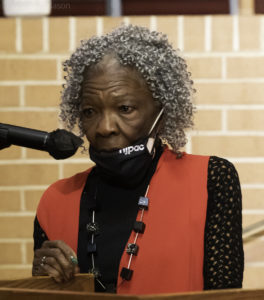
On November 13, Newark’s Bethany Baptist Church hosted a screening of the documentary, The WBGO Story: Bright Moments from Newark to the World, directed by filmmaker Chris Daniel. Dorthaan Kirk was the moderator.
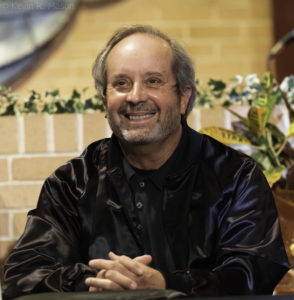
The film started with WBGO (88.3 FM, wbgo.org) founder Bob Ottenhoff saying, “It’s a story of a community of people that came together to create a cultural institution that has affected the lives of millions of people. What to me is the most gratifying is the success of the station has been made possible because of thousands of people playing some role, big and small.”
Newark was compared to New Orleans and St. Louis, as it has long been a jazz city. During the Great Migration, Newark gained a reputation as a place where musicians could find work and lodgings. Several clubs popped up that featured live jazz.
Bob Ottenhoff created the station in 1979, with help from Dorthaan Kirk and Boston radio personality Steve Robinson. WBGO gave Dorthaan a new direction after her husband, multi-instrumentalist Rahsaan Roland Kirk, died in 1977. Since Dorthaan had such a wide circle of friends in jazz, she was the perfect ambassador for WBGO. Percussionist Bobby Sanabria spoke glowingly about her. “Dorthaan Kirk is the heart of WBGO.”
There was initially skepticism about the viability of a listener-supported public jazz radio station, as well as skepticism about the location of Newark itself. WBGO originally depended on volunteers and members, and that continues today. Interesting fact: WBGO’s call letters came from Bob G. Ottenhoff’s name.
When WBGO began on the 4th floor of Central High School (before later moving to 54 Park Place in downtown Newark), there were many struggles, like no heat in the winter, and no air conditioner in the summer. Often, it was so hot, that on-air personalities would do their shows in their underwear!
Annual 24-hour Jazz-a-thons started in 1982, and artists volunteered their time. These fundraising events were recently revived. WBGO host Rhonda Hamilton talked about the artists she’s interviewed. After a long interview with Abbey Lincoln, Rhonda discovered a tape recorder malfunction, and Abbey graciously did the whole thing over again. Discussing the impact of WBGO on the jazz community, Hamilton said, “It’s a global thing, and so we have been able to make that connection through the music with listeners all over the world, and that’s a beautiful thing.” Bob Ottenhoff expressed amazement at what’s been accomplished in the first 40 years. He predicted that if they respect the past while embracing the future, the station will continue to thrive.
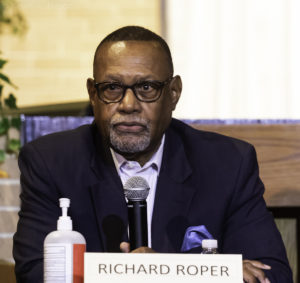
After the film, there was a panel discussion with Bob Ottenhoff, Richard Roper from the Office of Newark Studies, WBGO on-air personality Lezlie Harrison, director/producer of the film Chris Daniel, and Albert Pryor, former WBGO Program Director.
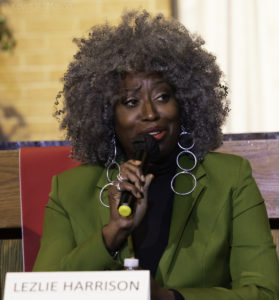
Lezlie Harrison became interested in jazz in college, and at 23, she worked up the nerve to send her demo tape to WBGO. She also discussed her experiences as a vocalist and living in Paris, before returning to on-air duties at WBGO.
Documentary director Chris Daniel has been a jazz fan since he was 12 years old. He was initially turned down for a grant for the film, but persevered and won a grant months later. Daniel praised Dorthaan’s valuable help while filming. About winning “Best Documentary” at the New Jersey Film Festival, Daniel said, “I’m glad people appreciate the story.”
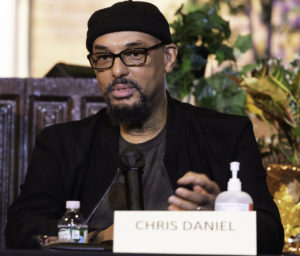
Bob Ottenhoff said, “I am by nature, an optimist. One of the best discoveries I made in the early years was a line of credit.” He joked that it was a better way to deal with bills than constantly going to the post office to see how many pledges they had received.
This event was an illuminating look at what is arguably the greatest jazz station in the world! The documentary can be viewed on PBS’s website at: https://www.pbs.org/video/the-wbgo-story-bright-moments-from-newark-to-the-world-erpmgf/.
Dianne Reeves Plus Artemis, Featuring Renee Rosnes, Anat Cohen, Ingrid Jensen, Nicole Glover, Noriko Ueda, and Allison Miller
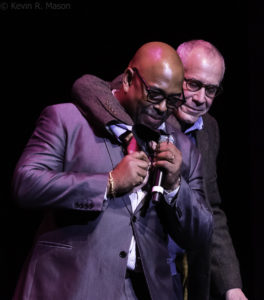
On November 13, John Schreiber welcomed the crowd and noted that this is the 10th anniversary of the TD James Moody Jazz Festival. When introducing Christian McBride, Schreiber recalled visiting Philadelphia with Dizzy Gillespie when McBride was a 14-year-old, playing in a high school orchestra. Dizzy noticed Christian, and said, “Who’s that bass player? That kid is a monster!” Christian and John exchanged quips about that time.
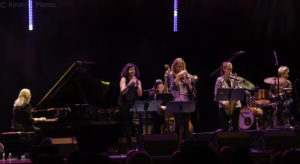
The program started with Artemis: Musical Director/pianist Renee Rosnes, clarinetist/saxophonist Anat Cohen, drummer Allison Miller, bassist Noriko Ueda, trumpeter Ingrid Jensen, and saxophonist Nicole Glover. This is a real female jazz supergroup! Renee addressed the crowd. “Welcome. We’re so happy to be here in a beautiful theater such as this, playing live music again for all of you.”
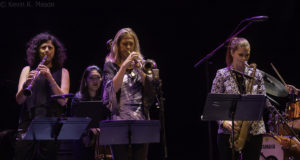
They started with Rosnes’ composition “Galapagos,” a lively, swinging number with great input from each player. Ueda’s song, “Step Forward,” was inspired by Noriko’s childhood music lessons, and the beginning sounded like a metronome. Then it segued into some excellent conversations, where Ingrid, Anat, and Noriko traded the solo spot. Cohen’s “Nocturnal” was somberly beautiful, and Renee’s “Big Top” was a sprightly song that was clearly inspired by the circus and evoked several emotions.
Ingrid Jensen’s lovely arrangement of “The Fool on the Hill” was a brilliant nod to the original, while bringing a percussive new perspective. Next was a tribute to the great trumpeter, Lee Morgan. “The Procrastinator” was a mixture of avant-garde and contemporary jazz, and the musicians were really swinging. Anat was especially demonstrative, dancing throughout.
“Goddess of the Hunt,” by Miller, was the final selection of Artemis’ set, and the crowd took in every hypnotic note. Women have come a long way in the once male-dominated field of jazz, taking on more roles as leaders, and are truly respected for their talent. Artemis amply displayed that women can swing with the best!
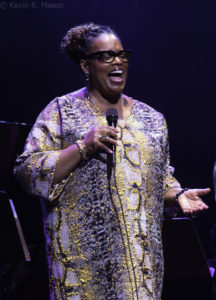
The concert continued with Grammy Award-winning vocalist Dianne Reeves, who’s one of the preeminent voices of our time. Her name belongs with legends like Ella Fitzgerald, Carmen McRae, and Sarah Vaughan. First, Reeves’ band came out: guitarist Romero Lubambo, drummer Terreon Gully, bassist Benjamin Williams, and pianist Peter Martin. They began with “Alone Together.” Then, Reeves came on stage to a standing ovation, and soon proved to be worthy of every clap. She began “Stella by Starlight” a cappella, dominating the venue with just her voice. Her band joined in this elegant rendition where Reeves scatted with extraordinary style. “We’ve been coming together slowly on the stages, and it just feels so good. It’s like medicine.” Although the pandemic has been challenging, she noted, “The biggest thing I got from all of this is that you must have grace for yourself, and everyone around you.”
Dianne followed with an enchanting improvised musical flight of fancy about how everyone had been doing during the pandemic. The group continued with a gorgeously somber composition by Wayne Shorter with lyrics by Doug and Jean Carn, “Infant Eyes,” where Peter Martin performed a breathtaking piano solo.
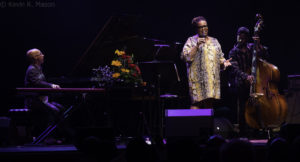
Dianne sang her marvelous, signature introduction of her band members. She also thanked the audience for being healing to her. After a well-deserved standing ovation, Reeves reminisced about growing up in a family filled with love, and the band did a moving version of Dianne’s iconic hit, “Better Days.” It was the perfect, hopeful song for these unusual times. There was a full house at NJPAC’s Prudential Theater, and with a concert like this, it’s no wonder!
The SASSY Awards – The Sarah Vaughan International Jazz Vocal Competition with Special Guests Christian McBride and Dianne Reeves
The 10th SASSY Awards were held at Victoria Theater on November 14. On the program, it stated: “What has become one of the top annual vocal competitions in jazz, The SASSY Awards offers outstanding jazz singers a one-of-a-kind platform for embarking on a career in the music business…Pulled from over 160 submissions from over 25 countries, gifted young contestants are evaluated on vocal quality, musicality, technique, performance, individuality, artistic interpretation, and ability to swing.”
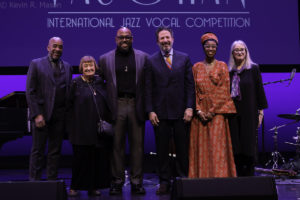
Christian McBride welcomed the crowd, stating how hard it was being a judge. “I’m much happier being your host.” Christian introduced the distinguished judges: Renee Rosnes, WBGO’s Steve Williams, Sheila Jordan, John Pizzarelli, and Jazzmeia Horn. McBride also introduced the talented band: Pianist/Musical Director Sergio Salvatore, drummer Buddy Williams, and bassist Gregory M. Jones. Christian announced the finalists: April May Webb, Arta Jëkabsone, Vik Gečytė, G. Thomas Allen, and Andrea Miller.
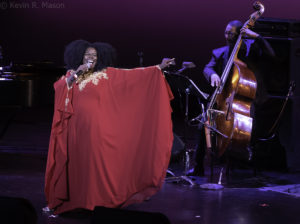
April May Webb is from Newton, Kansas, and grew up listening to her brothers’ classic jazz recordings. She studied at Paterson University with the late, great Mulgrew Miller. She performed a lilting “Social Call,” scatting with great ease. “How y’all doing, NJPAC! I have been waiting a long time to say those words.” April also sang an emotional “’Round Midnight,” and her soaring vocals had people calling out “Sing it, Girl!” She finished with her original composition, “They Keep Saying No,” a vivacious, Latin-infused song about obstacles she’d encountered in the music business.
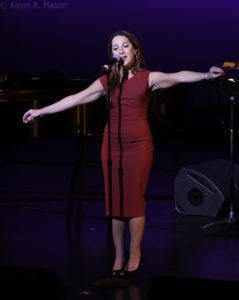
Andrea Miller grew up in Salem, Oregon, listening to her father, Dixieland musician Joe Miller. She has opened for Al Jarreau, among others. She feels most at home on stage when she is singing. Andrea started with Cannonball Adderley’s “The Masquerade is Over,” singing with conviction and style. Then Andrea dove right into a swinging “Bye, Bye Blackbird” that showed her superb scatting skills. She feels vocalists are responsible for telling a song’s story, so she always focuses first on the lyrics when learning a new tune. Her heartfelt “Willow Weep For Me” was quite poignant.
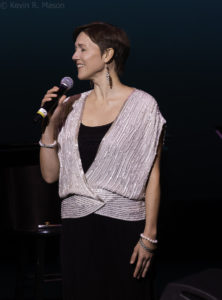
Vik Gečytė is from Lithuania, where jazz has a loyal following. She’s now based in Paris, and this is Vik’s second time as a finalist in the SASSY Awards, having appeared in 2019. Vik is not only a talented vocalist, but also a multi-instrumentalist, including whistles and the kalimba. She said Sarah Vaughan is part of every singer’s musical vocabulary. Vik started with a sprightly “That Old Black Magic.” Gečytė’s second song was a charming “That’s All,” where her rich voice served the song very well. In tribute to Abbey Lincoln, Vik stylishly performed Lincoln’s “The World is Falling Down.”
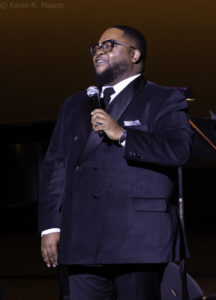
G. Thomas Allen, from Danville, VA, was first exposed to music in church. He heard Sarah Vaughan called “The Leontyne Price of Jazz” when becoming interested in jazz. He said traveling with Wynton Marsalis to France while in college changed his life. Allen started with a vibrant “Good Morning Heartache.” His first notes were so compelling that people started spontaneously clapping. His second song, “It Was Just One of Those Things” showed off his wide range, including a captivating falsetto. The song ended with an entrancing nod to “On Broadway.” Sarah Vaughan’s “Misty” inspired him, and his performance did her legacy proud.
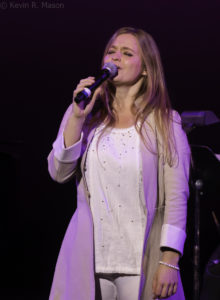
Arta Jëkabsone, from Latvia, grew up singing folk songs, and later studied jazz. She won First Prize at the Montreux Shure Jazz Voice Competition in Switzerland in 2016. In 2021, she received the Jazz Gallery Residency Commission Grant. Arta’s first song was a swinging “Four” that displayed impeccable scatting. Her second number was the gorgeous ballad “Gone With The Wind,” sung with great yearning. “Clouds” was her own moving composition about challenging times, heartbreak, and how clouds are a metaphor for life.
The judges deliberated during a 20-minute intermission. McBride returned and thanked title sponsor TD Bank and WBGO Radio. He also acknowledged those who passed away: the first producer of the SASSY Awards, Larry Rosen, and the Musical Director of the first four years, pianist Mike Renzi.
There was a video tribute to “The Divine One,” Sarah Vaughan. Past SASSY winners sang Sarah’s praises, and the video showed her winning the Apollo Competition, singing “Body and Soul.” There were scenes of her collaborations with Earl Hines, Clifford Brown, Billy Eckstine, and Quincy Jones, and the tribute featured many of her classic recordings. She was an NEA Jazz Master, received a star on the Hollywood Walk of Fame, and the street in front of NJPAC was re-named “Sarah Vaughan Way.”
Christian introduced John Schreiber, who reminisced about going on the road with Vaughan on a multi-city tour. He also praised McBride, describing his role as NJPAC’s Jazz Advisor as being “very James Moody-like.”
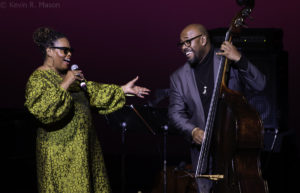
Christian McBride and Dianne Reeves then performed a song that Vaughan made famous, “Lullaby of Birdland.” Even with only a vocalist and a bassist on stage, they killed it! Dianne said she loves this competition and is inspired by the young vocalists. The duo delivered a melting “Tenderly,” where Dianne’s voice caressed each note, and Christian’s support was flawless. Dianne showed off her wonderful improvisational skills and added special lyrics just for the occasion. John Schreiber said, “These are the moments we live for!”
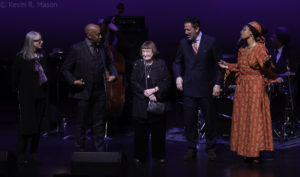
Christian brought all the judges back. Since NEA Jazz Master Sheila Jordan’s 93rd birthday was in a few days, McBride had the audience and judges sing “Happy Birthday” to Ms. Jordan. McBride said we should all be so lucky to be as vibrant at her age!
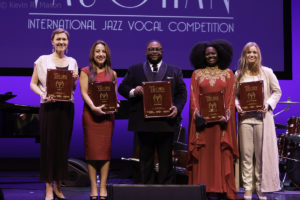
Then, the winners of the competition were announced. In 3rd Place was Arte Jëkabsone, in 2nd Place was April May Webb, and the SASSY Award winner was G. Thomas Allen! The competition was tight, and it was a very talented group, but G. Thomas Allen seemed to be the early front-runner. During his performance, someone even called out, “The first male winner of the SASSY Awards,” which indeed came true. Some years, there have been wide differences of opinion about who should win. But in 2021, it seems that the clear favorite won. However, this competition has been good to more than just the 1st Place winner. Many runners-up are doing big things in jazz, so even being a finalist is a prestigious thing!
Arturo O’Farrill and the Afro-Latin Jazz Orchestra
Wayne Winborne, Executive Director, Institute of Jazz Studies at Rutgers University, co-presented Arturo O’Farrill and the Afro-Latin Jazz Orchestra, with the Afro Latin Jazz Alliance, on November 19. The tickets for this concert were only $7.00, and Winborne thanked NJPAC CEO John Schreiber and NJPAC Executive Vice President David Rodriguez for keeping the price so affordable.
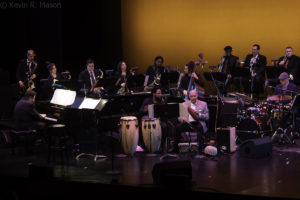
Pianist Arturo O’Farrill paid tribute to his father, legendary composer/arranger/big band conductor Chico O’Farrill, in celebration of the 100th anniversary of his birth. The concert included some of Chico’s most beloved masterpieces, as well as some rarely performed numbers. The orchestra began with a sensual “Savannah Blues” that featured top-notch playing. Arturo introduced “Afro-Cuban Jazz Suite” that his father wrote when he was only 26! This red-hot, danceable song had exciting licks, especially from Jeremy Powell on saxophone.
Then the orchestra played the rarely performed “The Second Afro-Cuban Jazz Suite.” It started with a hypnotic flute solo, then the other instruments slowly joined in on this redolent piece that evoked images of walking down a beach at sunset. There were many twists and tempo changes, each a delightful surprise to the appreciative audience. Arturo introduced some of the musicians, including bassist Bam Rodríguez, percussionist Joe Gonzalez, trumpeter Scott Englebright, and drummer Vince Cherico, all taking well-deserved bows.
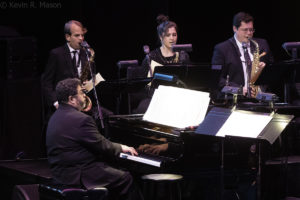
Trumpeter Jim Seeley was featured on Chico’s “Trumpet Fantasy” with Seeley displaying his considerable skills, while the orchestra gave outstanding support. “The Tanga Suite” by Mario Bauzá (who worked with Chico), was a scintillating number with irresistible rhythms and superb solo improvisations, with all the musicians seamlessly connected!
Arturo thanked Wayne Winborne and the folks at NJPAC, adding, “When you celebrate your father’s centennial, it means you’re getting old, which I’m glad to do.” Arturo O’Farrill and the Afro-Latin Jazz Orchestra left it all on the stage, and Arturo did a wonderful job of honoring the memory of his father.
NJPAC Presents: Celebrating George Wein
The life and legacy of jazz impresario George Wein was celebrated on November 20. George Wein was not only a promoter who created the Newport Jazz and Folk Festivals and other major festivals, he was a talented pianist, an art collector, and a philanthropist. The Newport Jazz Festival presented almost every noted jazz artist since its inception in 1954. It is considered the template for all the other music festivals that followed.
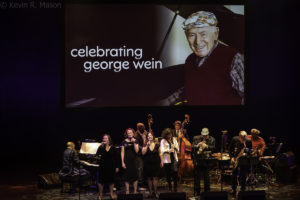
The evening started with a photo montage of George with many distinguished musicians. John Schreiber said, “This is a very special night for me, and I’m sure many of you. We are celebrating, through music, the spirit and the life of George Wein.” Schreiber praised Wein as a pioneer for social justice, who booked musicians based on talent, not race. George’s color-blind attitude was further exemplified by his long marriage to Joyce Alexander Wein, an African American woman, bucking the conventions of that time. Schreiber got his start in the business when George gave him the opportunity to write press releases for the Newport Jazz Festival, and he stayed with Wein for 20 years! Then, John introduced the person George chose to continue the legacy of the Newport Jazz Festival as Artistic Director, Christian McBride. Christian stated, “George’s reach spanned the globe. You can go to any jazz festival, anywhere in the world, and you can rest assured that the festival’s…Artistic Director was a protégé of George Wein.”
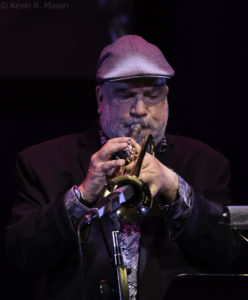
Clarinetist Anat Cohen was Musical Director, and she was joined by Christian McBride on bass; drummer Johnathan Blake; pianist Kenny Barron; saxophonist Lew Tabackin; trumpeter Randy Brecker; bassist Peter Washington; and the vocal group, Duchess.
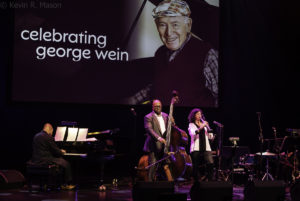
The first two songs, “Johnny Come Lately” and “The Mooche” brought forth images of smoke-filled jazz clubs and honky-tonks of yesteryear. Lew Tabackin spoke of the wonderful experiences he had with George. “Yesterdays,” was started by Lew, then joined by Kenny, Peter, and Johnathan, and they took the audience on an emotional journey. Anat talked about the great joy Wein had when he played piano. Randy Brecker reminisced about performing with the Newport All-Stars in Switzerland and told an amusing anecdote about that gig. George loved “I Can’t Get Started,” so the band played the beautiful ballad in his memory, and it featured a piercing trumpet solo by Randy.
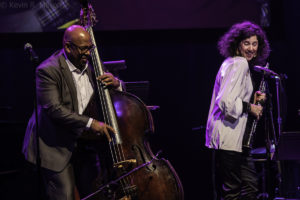
Anat and Christian played a lively bass/clarinet duet of Thelonious Monk’s “I Mean You” and a bluesy “Memories of You,” and the duo was a great reminder of how just two instruments played brilliantly can fill a large stage.
Kenny Barron returned, and Anat, Kenny, and Christian performed a joyful version of Barron’s “Calypso.” Anat introduced vocal trio Duchess: Amy Cervini, Melissa Styllianou, and Hilary Gardner. They performed “Swing, Brother, Swing!” sounding like a modern-day Andrews Sisters; nostalgic, but not dated. They deployed exceptionally tight harmonies that were accentuated by a great sax solo by Tabackin. Amy Cervini recalled talking to George at a dinner and learning how interested he was in up-and-coming musicians. “We’ll Meet Again” was poignant and romantic, with fine accompaniment by Brecker.
Anat said, “It’s very emotional for me, because we were supposed to play for his 96th birthday.” Cohen also said how honored she was to be playing with giants, how she was trying to play it cool, but was really nervous. Coming from someone who has already reached iconic status herself, it was endearingly modest. “On the Sunny Side of the Street” had all the musicians back, and they were so good, it is easy to imagine George smiling down from heaven at this talented group who had gathered to honor him.
Maria Schneider Orchestra
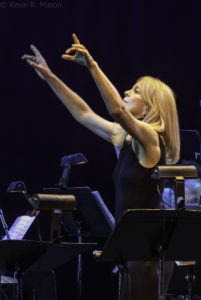
The last event of the 2021 TD James Moody Jazz Festival, on November 21, starred the Maria Schneider Orchestra, and the group started with a surreal, otherworldly song that engaged the listeners immediately. Maria Schneider, pianist/composer/bandleader/NEA Jazz Master, was joined by orchestra members that included percussionist Johnathan Blake, Julian Labro on accordion, pianist Gary Versace, saxophonists Scott Robinson, Steve Wilson, and Donny McCaslin, trombonists Ryan Keberle and Marshall Gilkes, and trumpeter Mike Rodriguez.
The concert featured music from Schneider’s CD Data Lords, starting with “A World Lost.” “Sputnik” featured Scott Robinson on sax, and it was eerily mesmerizing. Maria said, “Thank you all for coming out. This is the first time we’ve played for an indoor audience in almost two years!” “Don’t Be Evil” was a driving number with an avant garde feeling, and a sense of urgency. Maria introduced “Sanzenin,” saying, “I wrote this piece after visiting Kyoto,” and she described how beautiful the city is. The song was dedicated to the late pianist Frank Kimbrough, who was always up for risk-taking. On “Look Up,” Marshall Gilkes showed off a specially made trombone that he played in a way worthy of the invention.
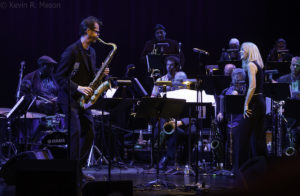
After an intermission, the orchestra returned, and Maria had Johnathan Blake show the crowd a stone inside a crafted piece of pottery as introduction to “Stone Song.” Maria spoke about her father, who was an amateur radio operator, and she spent much of her childhood listening to him talk to people all over the world. “CQ, CQ, Is Anybody There?” had Donny McCaslin’s sax at the center of this tribute to Maria’s dad, which was a commentary on time and space.
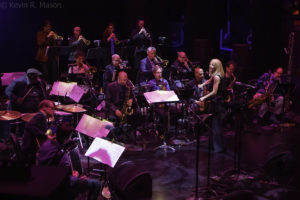
The title song from Schneider’s previous album, “The Thompson Fields,” was a contemplative ballad with strong work from the brass section, and a delicate piano solo from Gary Versace. “Data Lords” was a cautionary tale about artificial intelligence taking over, and the possible end of the human race. Then Maria said, “Happy holidays,” which got a nervous laugh, considering the increasing dependence on technology. Maria Schneider’s music is inspiring and thought-provoking, and it was a fine close to the first live TD James Moody Jazz Festival since 2019. With vaccine checks and people masked, it was a big step back to live, in-person, indoor music!
The 2022 TD James Moody Jazz Festival is returning in November, and the shows will include Fantasia and Jazzmeia Horn, Dee Dee Bridgewater and Savion Glover, Yellowjackets, and once again, The SASSY Awards! For more information, go to: https://www.njpac.org/series/james-moody-jazz-festival/.
